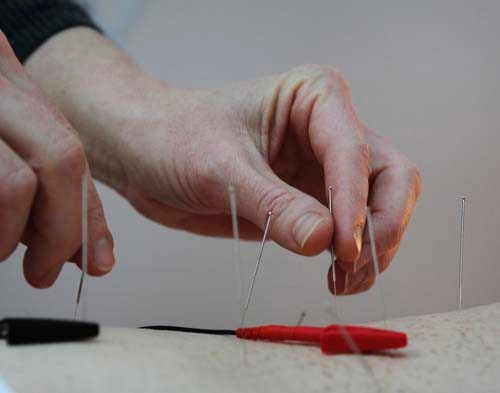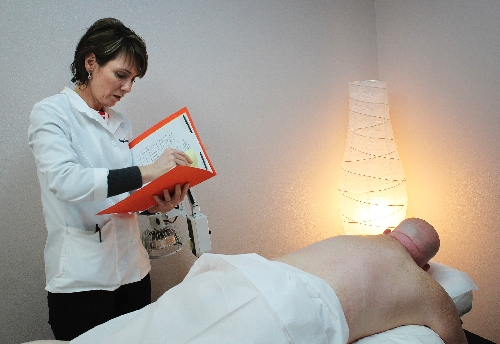Las Vegas home to new school of Oriental medicine,




To the accompaniment of traditional Chinese music —- a mellow sound designed by its composer as a gentle brain massage —- Dr. Farolyn McSweeney stuck needles with her bare right hand into Joseph Wines’ back.
Before he entered the acupuncture treatment room, Wines said two earlier sessions had nearly wiped out his back pain.
"How are you feeling?" McSweeney asked Wines, who now had the thinnest of stainless steel shafts protruding porcupine-style from much of his back as he lay on a massage table.
"I feel great," the 44-year-old electronics technician said with a contented sigh.
It is the kind of reaction that McSweeney, the president of the Nevada State Oriental Board of Medicine, said she often receives from patients at her Henderson office during and after acupuncture —- a healing practice she believes more Nevadans should get to experience.
In less than four years that should happen, given that an Oriental medical school, Wongu Peace and Happiness University, opened in Las Vegas in October. Ten students, all of whom already had to have bachelor’s degrees, are enrolled in a four-year Master of Science degree program —- McSweeney had much to do with its curriculum —- that will graduate OMDs, or doctors of Oriental medicine.
"We on the board knew a school would be good for Nevada but we wanted to make sure it had a solid curriculum," McSweeney said of the first school of its kind in Nevada. "I’m so glad that the school’s owners agreed with our position. I now believe Nevada and California have the most rigorous curriculum."
The program consists of 2,500 hours of classroom instruction and 1,000 hours of clinical training. Most of the courses are devoted to the study and practice of acupuncture and Chinese herbal medicine, integrated with courses in Western medical sciences and practice management.
"There are only about 50 (Oriental medical doctors) in the entire state, with about half of them up north, nowhere near enough for our population," McSweeney said as she sat outside the treatment room where Wines rested. "We need more."
To rid patients of pain, acupuncture practitioners stimulate specific points on the body, most often by inserting thin needles through the skin. In traditional Chinese medicine theory, this process is supposed to correctly regulate the flow of qi, or vital energy, along pathways known as meridians.
It is beyond an Oriental medical doctor’s scope of practice to order prescription medications or to do surgery.
McSweeney is well aware that there are many medical doctors who believe acupuncture and Oriental medicine in general are based on primitive and fanciful concepts of health and disease that bear no relationship to current scientific knowledge. And she knows those same doctors say research has yet to conclusively prove acupuncture effective against any disease, although the U.S. military and many cancer doctors now say they use acupuncture successfully to help patients deal with pain.
Dr. Steven Salzberg, of the prestigious Johns Hopkins School of Medicine, even said people are throwing their money away when they try Oriental medicine —- "scientifically, there is no more evidence for qi than there is for the tooth fairy or Santa Claus."
"They just haven’t had any experience with it," McSweeney said of critics. "I have seen acupuncture work. I have many patients who come to me for back pain alone. … With the school opening, more people can be helped down the line."
OPENING THE SCHOOL
The school was the brainchild of the late Rev. Sun Myung Moon, a self-proclaimed messiah and the controversial founder of the Unification Church. The school, now in a temporary headquarters at 8215 S. Eastern Ave., will move in the spring to a permanent two-building site at 8620-8630 S. Eastern Ave.
In coming years, the school will open a clinic, with Oriental medical services open to all Southern Nevadans.
The affiliated organizations of the Unification Church —- a religious movement notable for mass weddings now found in most nations of the world —- became a multibillion-dollar empire at the time of Moon’s 2012 death at age 92. But Wongu is run by a nonprofit board, not the church, program director Jason Cho said.
Cho said money for the school came from Moon, who spent 13 months in prison during the 1980s for filing false income tax returns. In Las Vegas, the Unification Church owns a $2.3 million mansion that Moon lived in and 10 other properties worth more than $6 million.
When the school opened last year, Cho’s father, Wongu University CEO Jung Soon Cho, envisioned a first class size of 40.
"It is not so easy to recruit," Jason Cho noted recently. He envisions 200 students one day going full time to the school.
The school has a yearly tuition of $15,000. Tuition at the University of Nevada School of Medicine is about $21,000 a year.
Job Krugly, a 33-year-old chiropractor with an office in Southern Nevada, is one of the school’s first students. He decided to pursue an Oriental medicine degree because he thinks it will add another dimension to his practice.
LEARNING THE TECHNIQUES
On this day Krugly has taken a class that combines the traditional Chinese movement exercises of tai chi and qigong. He said he can envision having his patients use the exercises to improve posture, balance, coordination, endurance and flexibility.
Many medical doctors say studies of Oriental medicine that show it in a favorable light are flawed. But there are true believers in traditional Chinese medicine who cite a small study that purports to show that qigong boosts immunity and resistance to the shingles virus in older adults.
"I really think the exercises will be helpful to people," Krugly said.
Students won’t start working with needles for acupuncture until next year, Wongu’s dean of students, Ron Sokolsky, said. This year, he said, students will learn where to place the needles on a patient’s body.
It appears that when students do start to use needles on patients, they’ll follow McSweeney’s lead and won’t wear sterile surgical gloves. Sokolsky said he didn’t believe they are necessary, but the Nevada State Health Division, the World Health Organization and top researchers recommend doing so to prevent infection.
"There’s usually not a problem with bodily fluids when you’re doing acupuncture," said McSweeney, who uses disposable single-use needles and frequently washes her hands during acupuncture. "Every now and then there’s a drop of blood but my fingers and hands don’t come in contact with it."
Dr. Ihsan Azzam, state epidemiologist, said he was surprised that acupuncturists weren’t using all universal precautions, which are stressed by the Centers for Disease Control and Prevention when blood or bodily fluids are present.
"Acupuncture breaks the integrity of the skin —- the risk of infection, while small, is not zero," he said, adding that the wearing of sterile gloves for procedures with needles should be a "no-brainer."
There is no penalty, however, for health care providers, either from the CDC or the state, who don’t follow the recommendations of public health experts, Assam said.
"We shouldn’t have to regulate the obvious," Assam said.
He said patients of acupuncturists should demand that Oriental medical doctors follow all universal precautions.
In 2010, microbiologists at the University of Hong Kong, in an editorial published in the British Medical Journal, called for tighter infection control measures for acupuncture, noting at least five outbreaks of hepatitis B virus worldwide as a result of the treatment, with an acupuncturist the source in one outbreak. In the other cases, the sources were infected patients and the virus was transmitted through dirty needles.
"Although no clear evidence exists to support a link between acupuncture and HIV infection, there are reports of patients with HIV who had no risk factors other than acupuncture," the editorial said.
The researchers wrote they believe the 50 cases of acupuncture-related infection reported worldwide to be the tip of the iceberg.
McSweeney said she realizes many Southern Nevadans are concerned about infection since the deadly hepatitis outbreak five years ago, but she stressed there is no legal reason for her to wear gloves.
"I’m sure there are acupuncturists who wear gloves on every patient," said McSweeney, who manipulates the needles in the patients with both of her bare hands. "Most do not. We want to feel the skin, so nothing gets in the way of our patients."
BLENDING EAST WITH WEST
Wongu student David Burke looks forward to the day when he has patients.
"I think acupuncture and herbs can give people the level of life they’re looking for," he said. Burke particularly likes that Oriental medicine isn’t just reactive, but proactive and preventive.
In coming months, he and other students will learn how to use a wide variety of herbs that are supposed to increase energy and improve circulation.
They will also become proficient in tuina, a muscle manipulation and massage therapy. Moxibustion, a type of therapy that involves applying heat to acupuncture points using the traditional Oriental herb, mugwort, will be studied. Acupuncturists say the therapy stimulates healing and restores balance to the body.
There will also be sessions on cupping therapy, which uses glass or plastic cups placed on the surface of the body to create localized suction. Believers in traditional Chinese medicine think it promotes blood and qi flow, stimulates the release of toxins and helps musculoskeletal relaxation.
Dr. Yeaji Suh, Wongu’s academic affairs director, is confident the students the university turns out will be welcomed in Nevada.
"We are interested in future leaders, in helping the community," she said.
The cost of treatments from doctors of Oriental medicine range from $50 to $120, McSweeney said.
And she said most insurances in Nevada don’t cover such treatment. She argues that the money is well worth it because acupuncture can help with, among other things, sinus problems, headaches, jaw pain, asthma, stress and post-traumatic stress disorder.
The National Institutes of Health says more research must be done to ascertain whether that’s true.
McSweeney is excited for both the future graduates of Wongu and for Southern Nevadans.
"This will be the best time to live," she said. "Western and Eastern medicine can complement each other and people will be better off."
Contact reporter Paul Harasim at pharasim@reviewjournal.com or 702-387-2908.












